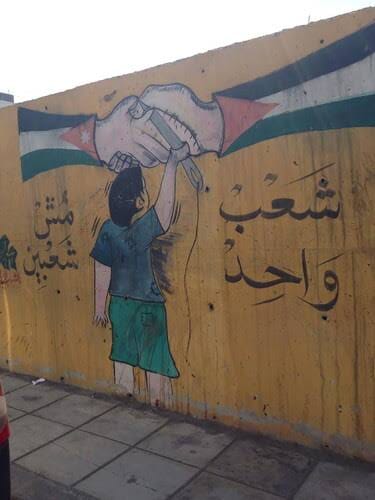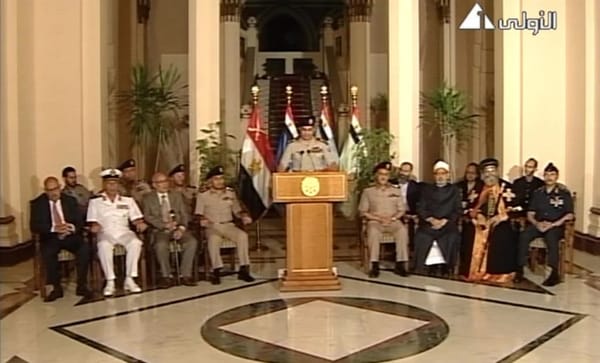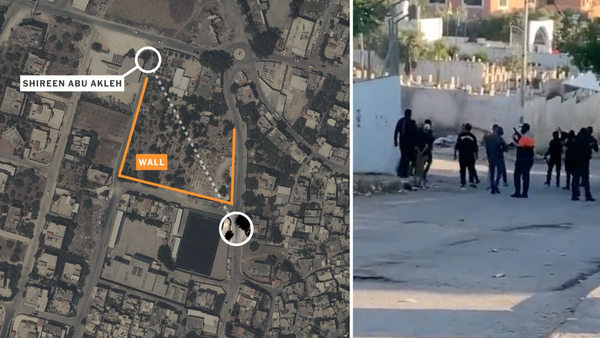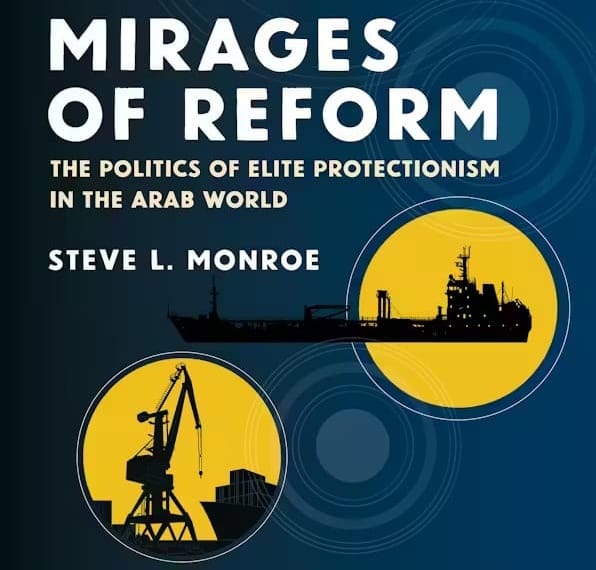How Sudan got to the abyss
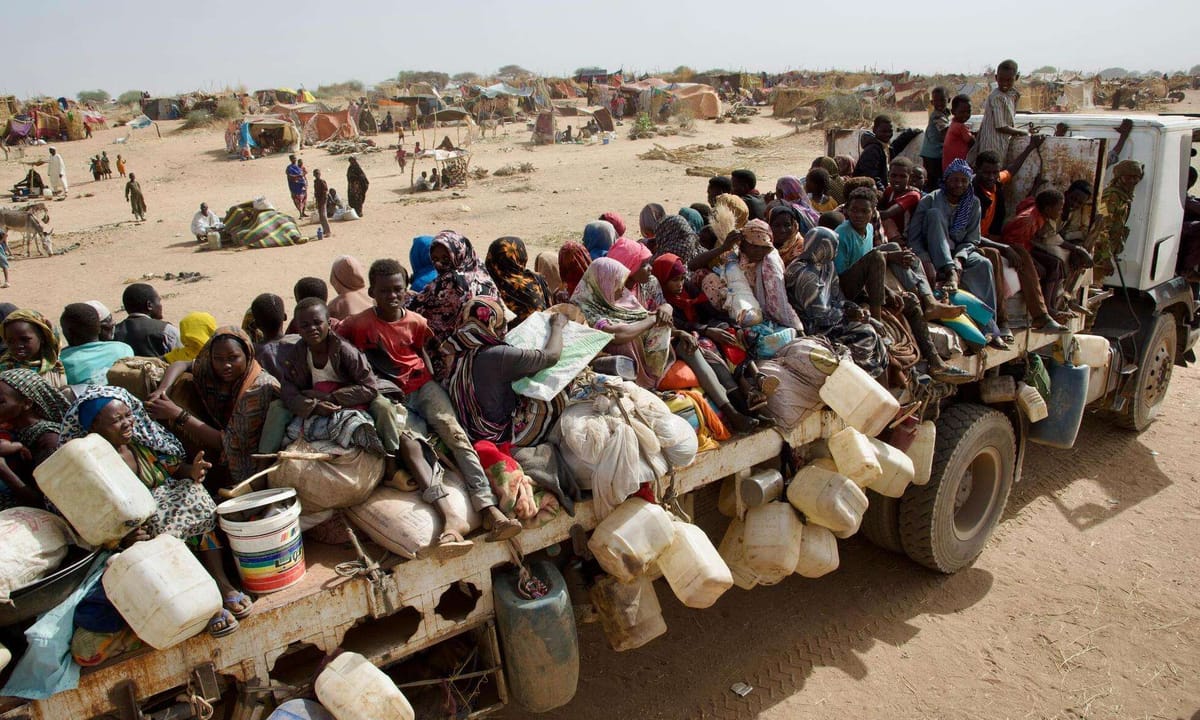
Plus Syria, Title VI investigations, and a full roundup from the MENA Academy
The war in Sudan is decidely not a nihilistic "war about nothing", argues Khaled Mustafa Medani in a tour de force article in the Fall 2025 issue of the APSA's section journal MENA Politics. Medani, the author of the fantastic 2022 book Black Markets and Militants (I reviewed it here), has penned a short but powerful overview of Sudan's fall from popular revolution to civil war. His essay explores five key drivers of the conflict: "(1) the nature of the formal and illicit economy upon which the “deep state” was established under the former Islamist regime, (2) internal conflicts in the country reflecting long-standing, historical, social and political divisions, (3) the deeply entrenched military security and coercive parallel security and coercive apparatus, (4) external forces shaping the conflict, (5) and the “logic” of violence as an outcome of rival nascent state building in the context of war." Back in 2022, I wrote about an important new book by Willow Berridge, Justin Lynch, Raga Makawi and Alex de Waal: Sudan’s Unfinished Democracy: The Promise and Betrayal of a People’s Revolution which ended with the revolution embattled and incomplete; Medani updates the story in light of the violence and humanitarian catastrophe of the last three horrific years.
Medani traces longstanding conflicts between the center and periphery in Sudan and the legacies of the distinctive "deep state" political economy developed by the miltary-Islamist regime of former president Omar al-Bashir and largely inherited by president Abd al-Fatih Burhan. He then traces the degradation of the state as oil prices collapsed and the rise of the informal economy. He shows how the informal economy empowered the rise of Hemedti's brutal Rapid Support Forces under Bashir, and impeded the efforts to create a unified military after the revolution. He persuasively identifies Burhan's core interests in the war as resisting activist demands to dissolve the institutions of the deep state: "what undermined the transition to democracy was the previous government’s inability to dismantle the vestiges of the vast financial empire wielded by the security sector and the military." And he demonstrates how the rise of illicit trade in gold as an alternative to oil fueled the rise of the RSF: "the transition from oil to gold has shifted the country’s political economy from a more centralized oil-based patronage system towards a more fractured system whereby rents, derived from gold smuggling, are utilized to fund the recruitment of irregular militia forces."
He concludes with the provocative claim that "while in the first two years of the war in Sudan the conflict primarily represented a rivalry between a para-legal militia and the Sudan Armed Forces, in its current manifestation it is best described as a violent contest between two forms of state-building efforts." That, he argues, helps to explain the extreme nature of violence and brutality: "Understanding the current dynamics of war as a contest between two rival military and political actors waging war and extracting revenue, albeit through violent means, in order to build new states also helps to explain the logic and severity of the mass-scale violence against civilians." Finally, Medani does not shy away from pointing to the UAE as the key external actor driving these horrors: "the RSF has used windfall profits from the gold trade and its strategic alliance with the UAE to expand its recruitment drives and to wage war against the civilian population, even as it battles its former partners among the SAF leadership." It's a must read, so read it; I hope it foreshadows a book to come.
The rest of the fall issue of MENA Politics is packed with fascinating contributions, including a roundtable about the implications of the drastic cuts to research funding for scholars of the Middle East and Laurie Brand's dispassionately devastating dissection of the assault on academic freedom and Middle East Studies. The real standout is the symposium organized by Rana Khoury and Sefa Secen on "Syria in Transition." Like the POMEPS Studies collection we will be publishing soon, the roundtable features short essays by a range of outstanding younger scholars on the many issues confronting Syria after Asad. Tiina Hyyppä discusses the challenges of rebuilding social trust amidt key Sharaa administration failures. Sumaya Malas highlights the risks of reliance on self-interested external powers for financing reconstruction, arguing for the need to build effective state sovereignty. Salam Said details key failings of state building and order building by Sharaa's administration, particularly its overreliance on violence in the periphery. Emily Scott calls for meaningful transitional justice as a building block of democracy. Sefa Secen examines the challenges of refugee return. And Ammar Shamaileh provides a fascinating glimpse of the emergence of a 'new class' around the new regime. The whole roundtable is fascinating and timely, and should be widely read.
The other major publication I want to highlight this week is the MESA and AAUP report "Discriminating against Dissent". The report, assembled by the two professional organizations which have most effective and powerfully fought back against the assault on academic freedom, rigorously documents how "weaponized allegations of antisemitism driven by pro-Israel groups have been central to attacks on campus speech—including the Trump administration’s brazen war on higher education." Based in part on the work of a MESA Task Force I've been involved with, it is, to my knowledge, the first empirical study of Title VI reporting related to antisemitism. The key findings are disturbing and important, and should prompt deep reflection about how we got here:
"The report documents the surge in investigations since October 7, 2023, with more opened in the last two months of 2023 (25) than in all previous years combined (24). Investigations broke record numbers in 2024 (39) and are on track to do so again in 2025 (38, as of September 30).
Most investigations are prompted by complaints received from the public, including people who have no relationship with the schools under investigation. All but one of the 102 antisemitism complaint letters analyzed focus on speech critical of Israel; of these, 80 percent describe speech critical of Israel or Zionism with no reference to Jews or Judaism as antisemitism; 50 percent of the complaints consist solely of such criticism. "
The report offers important historical context, showing how Title VI of the 1964 Civil Rights Act to prohibit "discrimination based on “race, color, or national origin” in programs that receive federal financial assistance", came to concerned with antisemitism in the first place. The first efforts to use Title VI to police criticism of Israel came in the 2000s, as conservative activist Kenneth Marcus used his position in the Bush administration to attempt to equate anti-Zionism with anti-Semitism and to police Middle East Studies programs on campus. In 2010, the Obama administration restored and expanded Marcus's policy which had fallen by the wayside under Bush and made it considerably worse. Marcus then joined the first Trump administration as head of OCR and pushed for the adoption of the controversial IHRA definition of antisemitism which equates it with criticism of Israel. Biden, in turn, expanded and built on that approach; while it did not officially adopt the IHRA definition it in practice incorporated its approach and over time arguably exceeded it in terms of the breadth of what political speech it would consider antisemitism.
That was the basis for the tidal wave of Title VI investigations unleashed after October 7, 2023. Prior to that date, the report notes, only 24 antisemitism investigations had even been opened; more than that were opened in November and December 2023 alone. The head of Biden's OCR was extremely aggressive in opening these investigations, often opening them 'within a day' of receiving complaints and on the basis of extremely limited information. Essentially all of the 102 complaints examined by the report involve criticism of Israel or Zionism; at least 51 of the complaints make no reference to Jews or Judaism at all. A quarter of the complaints came from external organizations or individuals rather than from someone actually on campus (another 22% did not identify the complainants). Zionist and right wing activist organizations were involved in almost 80% of the named complaints. From October 2023 onward, Biden's OCR investigated more antisemitism complaints than it did complaints related to racial harrassment; Trump has stopped investigating racial harrassment more or less completely.
The AAUP/MESA report provides an essential service by documenting and contextualizing these changes in the use of the Title VI complaint process around antisemitism, long before the Trump admininstration fully weaponized it in its brazen assault on all of higher education. It's important to see exactly how, as I've written before, the US government came to consider "pro-Israel" the only identity meriting Title VI protections – a conclusion as far as it could be from the original intent of the Civil Rights Act. And as nice as it might be to blame it all on Trump, that is just not the case. For more on all these issues, see some of my other pieces on the challenges facing campuses, the challenge to academic freedom in historical perspective, Gaza and Middle East Studies, the battle to frame the campus protests, and self-censorship around Israel/Palestine.
And now for this week's roundup from the MENA Academy. It's a rich and diverse set of articles, hopefully something for everyone! We lead with Sean Yom and Steve Monroe on anti-corruption campaings in Jordan and Kaddir Mehiriz and Nizar Jouini on public spending and elections in Tunisia. We then spotlight two articles on contested political orders: Federico Donelli on the Houthi attacks on shipping and the Red Sea security complex, and Guilaine Denouex and Robert Springborg on the failed approach to failed states. Next up, two articles on women in conflict zones: Araa al-Jaramani and Moosa ElAyah on Gender Based Violence in Syria, and Susanne Dahlgren on women's activism in Yemen. We then feature Mai Azzam and Lovise Aalan on Sudanese youth activism, a provocative piece by Yigal Levy on the logic and politics of casualty counting, and Bilal Hamamra and Ekrema Shehab's powerful critique of humanitarian aid in Gaza.
Sean Yom and Steve Monroe, "The politics of anti-corruption crackdowns in autocracies: Evidence from Jordan," Mediterranean Politics (November 2025). ABSTRACT: Many autocracies pledge to curb corruption within public institutions—and fail. Yet the burgeoning literature on this topic overlooks an intriguing puzzle: while anti-corruption campaigns often do not clean up politics as promised, they still punish at least some perpetrators for their financial and political abuses. What determines how much corruption autocrats target, and whom they punish? We provide novel answers with a multi-method analysis of a crucial case, the Hashemite Kingdom of Jordan. We leverage new data from public investigations, local media sources, and municipal audits to assess how the Jordanian regime has tackled corruption over the past two decades. We find that Jordan’s limited anti-corruption efforts prioritize punishing petty corruption involving low-level civil servants, rather than grand corruption by powerful regime elites. We argue that such selectivity reflects the personalistic nature of Jordan’s regime, given the importance of sustaining a solidary loyal elite that supports the king. We further find through statistical tests that despite their selective nature, these anti-corruption measures still abide by a strategic logic of timing, which underscores their political value. Anti-corruption investigations are more likely to occur after major protests and prior to elections, reflecting a desire to win over public sympathy.
Kaddir Mehiriz and Nizar Jouini, "The effect of electoral politics on the distribution of public spending in the context of democratic transition: evidence from Tunisia," Democratization (November 2025). ABSTRACT: Redistributive politics theories suggest that in democracies, political parties use redistribution to gain the support of their core constituencies. This study examines this assumption in the context of the democratic transition in Tunisia. Using data on legislative elections and public expenditures for the period 2011–2019 and panel fixed effect methods, we found a negative association between government parties’ share of seats and public spending per capita, rejecting therefore the core constituencies assumption. Moreover, this negative relationship was observed in the case of Ennahda party that, after losing the 2014 elections, entered a coalition government led by Nidaa Tounes, but not in the latter's case. These results suggest that this pattern of spending distribution is part of a general strategy according to which, instead of prioritizing short term electoral benefits, the ruling parties, particularly Ennahda, strived to build strong political support for democratic transition and avert autocratic reversal threats. However, the electoral cost of this strategy is mainly borne by the coalition members that are more likely to suffer from the adverse effects of the reestablishment of autocracy. This study thus underlines the importance of considering the fragility of democratic institutions and implications of their eventual collapse in studying redistributive politics.
Federico Donelli, "Maritime Disruption in Yemen: The Making of a Hybrid Red Sea Order," Middle East Policy (November 2025). ABSTRACT: Since late 2023, Houthi forces in Yemen have employed drones and missiles to disrupt commercial shipping in the Bab al-Mandeb Strait, necessitating global rerouting and prompting multilateral naval responses. These events challenge the conventional view that the land domain is fragmented and prone to conflict, while the maritime domain is cooperative and regime-governed. To explain the developments in Yemen, this article applies regional security complex theory, arguing that the Red Sea is evolving into a hybrid security complex where land- and sea-based threats, actors, and logics are converging. The analysis of the Yemeni case demonstrates how the combination of cross-border rivalries and territorial control by insurgents can enable the projection of force into maritime spaces, undermining global shipping and security. In the absence of progress on land-based governance, maritime insecurity is likely to compel external stakeholders to oscillate between temporary trade-protection measures and longer-term political stabilization efforts. The analysis highlights the need for integrated, cross-domain approaches to regional security that address the interplay of nonstate actors, infrastructural vulnerabilities, and geopolitical competition shaping the emerging Red Sea order.
Guilaine Denouex and Robert Springborg, "From Rebuilding to Restoring Political Order: A New Agenda for Failed Arab States," Middle East Policy (November 2025). ABSTRACT: A new approach to rebuilding collapsed states is being trialed in the Arab world, most conspicuously by the Trump administration but with broad international support. This replaces the previous model—favoring democratic building blocks like inclusion, compromise, reconciliation, accountability, and citizenship—which is now seen as too costly. The new paradigm instead elevates powerful actors who can impose political and social order, backed by an emerging Council of the Middle East comprised of the leading Gulf states, Turkey, and Israel. This article examines the new approach, including the 20-point plan to end the Gaza war. It finds that there are two fundamental contradictions. One is that the members of the potential council have divergent interests; Israel, for example, depends on instability within Arab states to ensure its hegemony. The second is that regional states have failed precisely because they were unaccountable and authoritarian. Picking a strongman or militia to reimpose order is to double down on the failed strategy. This analysis shows that it would be better to revise the previous model and make it more incremental, responsive to citizens, and autonomous from the strategic and economic interests of powerful external actors, including the United States.
Araa al-Jaramani and Moosa ElAyah, "Voices of resilience: Civil society and community perspectives on gender-based violence in conflict-affected Syria," Mediterranian Politics (November 2025). ABSTRACT: Gender-based violence (GBV) has escalated during the Syrian conflict, yet the responses of local civil society organizations (CSOs) remain underexplored. This article examines how Syrian CSOs conceptualize and respond to GBV amid institutional collapse and fragile governance. It argues that these organizations have evolved resilience-based, gender-responsive mechanisms that function as informal governance systems, filling institutional voids and fostering grassroots peacebuilding distinct from international top-down approaches. Bridging feminist theory, resilience studies, and conflict governance, the research shows how community-based actors operate as de facto governance institutions. Employing a mixed-methods design, it integrates survey data from 1,212 respondents across three Syrian regions with interviews from leaders of women-focused CSOs. Quantitative results reveal regional and demographic variations in GBV awareness, with younger, educated women expressing stronger opposition to violence. Qualitative insights highlight that CSOs provide legal aid, psychosocial counseling, and economic initiatives enabling women to regain agency amid cultural and legal fragmentation. These organizations act as resilience hubs translating feminist principles into localized action and gaining societal legitimacy. The study urges international stakeholders to strengthen—rather than replace—local initiatives by prioritizing indigenous knowledge, women’s leadership, and sustainable, context-sensitive support for inclusive recovery and long-term resilience.
Susanne Dahlgren, "Resilience and Resistance: An Anti-Exceptionalist Perspective on Yemeni Political Struggles," Middle East Law and Governance (October 2025). ABSTRACT: “Women” as a group of people and an analytical category has long been treated from an exceptionalist perspective. Not long ago, it was customary to write a country’s political history only through men’s eyes, with women as a short mention in the index. In Middle Eastern Studies, this custom was accelerated by the self-imposed belief that male scholars cannot study women or that women “belong” to an imaginary “private sphere,” fully disconnected from the realm of politics. In Yemeni Studies, the contribution of women’s activism in shaping polity and society has been overlooked in the narrative of the country’s history. In Western and Western-educated scholarship, women’s activism has been merely regarded from the perspective of “women’s issues,” considered marginal in the first place. In my paper, I look at women’s activism through the readings that the activists have made on critical issues in national politics. My interest is not narrowly examining how these groups have been able to promote women’s causes but to study how the activists and their organizations have analyzed national politics, what kind of choices they have made, and which initiatives have proven insightful for the entire nation and the region. With case studies from the Yemeni city of Aden, from the late British colonial time throughout the Socialist regime period to the current republic at war, I discuss activist women’s political choices and posit that their insights warrant attention: they have usually had it right. My paper is based on long-time ethnographic fieldwork in Aden and archival and media sources.
Mai Azzam and Lovise Aalan, "Political togetherness: pursuits for change among the protesting youth in Sudan 2018–2022," Critical African Studies (November 2025). ABSTRACT: The uprising in Sudan since 2018 is an example of youth agency in the form of protest. The Sudanese youth mobilisation started, however, long before these anti-regime protests, through engagement in different forms of youth voluntarism and charity. While African youth mobilisation often is described as an outcome of tension between an urban underclass and a repressive state [Branch, Adam, and Zachariah Mampilly. 2015. Africa Uprising: Popular Protest and Political Change. London: Zed Books], we argue that in the Sudanese context, a collaboration between different classes, including the middle class, has been key in the fight against the autocratic government. Through interviews with youth activists in Khartoum, we examine how youth-led charity groups managed to change the public urban spaces that were intentionally made apolitical by the previous Islamist regime into vibrant and political ones, which were crucial in bringing about the 2018 uprisings. We propose to analyse the youth protests as an expression of ‘political togetherness’ – how sharing similar political challenges and aspirations not as individuals but as a group, transcending class and other divisions, becomes a political identity. Most of the theorising into political movements and collective action emphasise political action. Political togetherness, however, allows us to grasp the whole experience of the action; the feelings, atmosphere, political positions, opinions, thinking as a group, forming trust and building friendships.
Yagil Levy, "The logic of body counting: from Korea to Gaza," Critical Military Studies (November 2025). ABSTRACT: This study examines body counting practices of enemy combatants across six critical conflicts: Korea (1950–1953), Vietnam (1955–1975), Iraq (2003–2011), Afghanistan (2001–2014), Israel’s operations in the West Bank and Gaza (from the late 2010’s onward), and the Israel-Gaza war (2023–2025). I argue that body counting repeatedly emerged as a key criterion for assessing military progress once warfare shifted from occupying territory to pursuing other goals, such as attrition, destroying enemy forces, enhancing deterrence, counterinsurgency, and counterterrorism. Post-World War II military managerialism made this criterion a ready-made method. Such vague and often unwinnable goals coincided with diminished legitimacy for the use of force and for bearing its associated costs. Thus, the legitimation system shifted from legitimating results—the outcomes of military operations—to legitimating means, focusing on how results are produced and emphasizing their direct impact through casualty numbers. Initially, body counting served as a criterion for progress, but over time it assumed additional functions: encouraging killing, reflecting and promoting dehumanization, demonstrating resolve, mitigating casualty sensitivity, and serving as a humanizing mechanism by distinguishing between intentionally killing combatants and protecting non-combatants.
Bilal Hamamra and Ekrema Shehab, "Humanitarian aid in Gaza: from lifeline to arena of violence and exclusion," Third World Quarterly (November 2025). ABSTRACT: This qualitative study examines how the distribution of food aid in Gaza has been transformed into a site of violence, deprivation, and psychological distress during genocide. Drawing on in-depth interviews with 23 residents of Khan Younis and Gaza City including women, men, and children, the analysis identifies five interconnected themes: fatal risks at distribution centres, the weaponisation and politicisation of humanitarian assistance, gendered suffering and the collapse of family support, inequity and the erosion of social trust, and pervasive surveillance producing lasting trauma. The findings reveal that aid delivery, rather than ensuring safety and sustenance, functions as a mechanism of control, collective punishment, and social fragmentation, reflecting broader settler colonial logics of domination. Women and children face heightened vulnerability and repeated exposure to danger, carrying the heaviest burdens of exclusion and trauma. Grounded in the lived experiences of Gazans, the study demonstrates that humanitarian aid, militarised and entangled with surveillance and coercion, reinforces structural violence rather than alleviating it. The article underscores the urgent need for humanitarian interventions that safeguard protection, dignity, and genuine impartiality, while advancing a decolonial rethinking of humanitarianism as solidarity rather than control.
